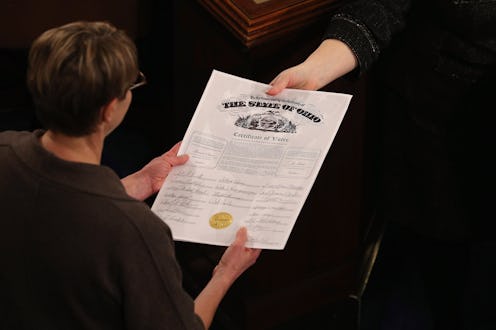News
How The Electoral College Will Impact The Election
Presidential candidates are currently scrambling to win primaries and caucuses to make their minimum delegate counts and secure their nominations, but the ultimate deciders in the race for the presidency haven't even been chosen yet. The electoral college, the amorphous and enigmatic entity that resurfaces every four years, is just starting to come back to prominence in the media ahead of the November general election. As the subject is only topical for a few months every few years, it's easy to forget exactly how the electoral college works, but it's absolutely critical to understand in this election year.
The electoral college is made up of 538 electors that represent the legislative votes for the people of the United States — one for each of the nation's 435 representatives and 100 senators, as well as 3 representatives from Washington D.C. The number of electors in the college is equivalent to the number of legislators for accurate representation. The people who actually cast the votes for president are a variety of politically active individuals chosen by each political party on a state-by-state basis.
Then, on Election Day, the candidate who wins the popular vote in each state is awarded all the elector slots, and the electors will cast their vote for their candidate.
But this year, the electoral college could have huge significance when it comes to picking the president. There's such a thing as a "faithless elector" who doesn't vote for the designated candidate. Although it's exceeding rare for an elector to dissent from the popular vote, it has happened before, and, especially in this ideologically tense election, it could happen again. If electors from any battleground states swing during the voting process, it could disrupt the delicate balance of electors and change the final vote.
Another possibility is an election similar to the 2000 election, when Al Gore won the popular vote but lost in the electoral college. George Bush garnered more electoral votes from a high number of smaller, more conservative states, which could happen again this year for the Republican nominee. General election polls show incredibly tight margins as of right now, and the long game of the general election will likely be targeting battleground states like Ohio and Pennsylvania even more heavily than usual.
The only thing predictable about this election cycle is that it's completely unpredictable. There's no telling what could happen with the electoral college this year, but following the progress of the political process with a critical eye is essential to this campaign. A lot is at stake ideologically for the country in this election and how the election is decided needs to be understood and examined thoroughly to ensure a democratic process.
